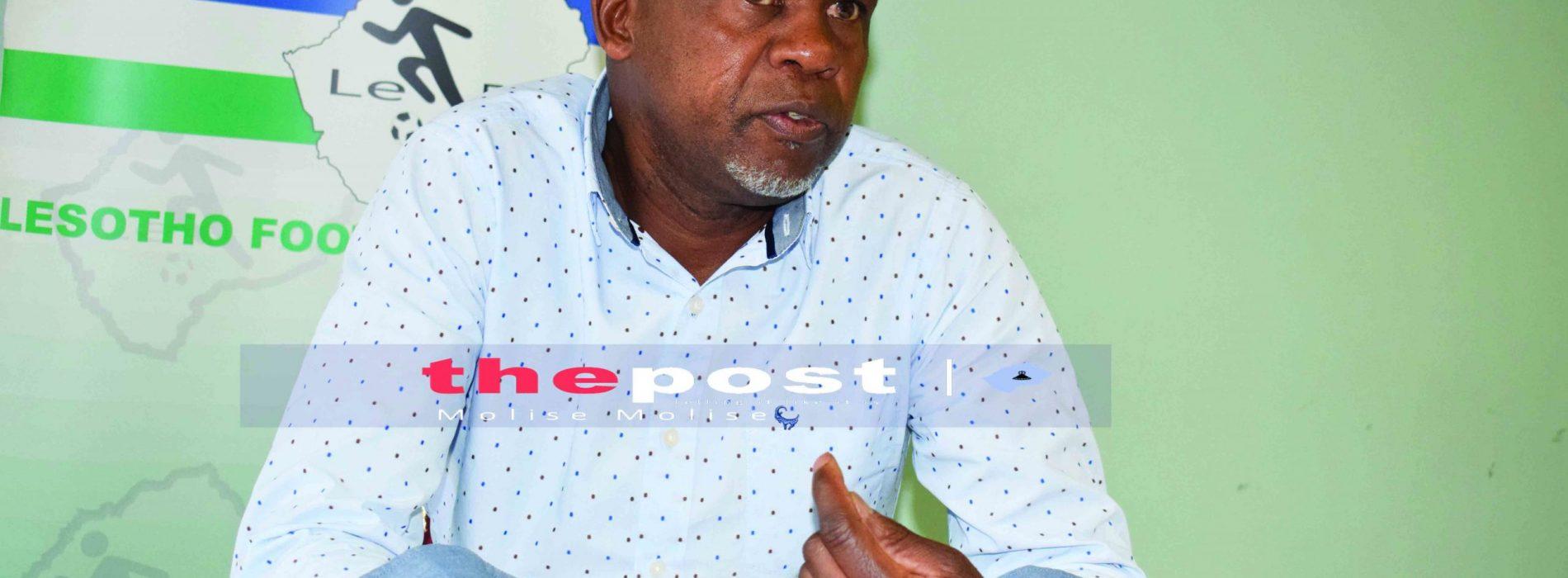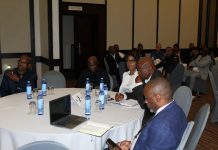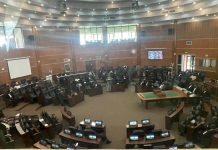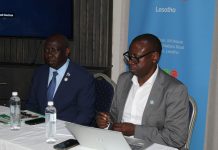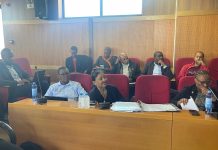Africa-Press – Lesotho. A few weeks ago the Lesotho Football Association (LEFA) announced the national team Likuena would be overhauled and LEFA’s technical director, Leslie Notši, is the man that has been given the responsibility to rebuild the national team.
Notši’s task is to refresh the senior side and build a foundation for the new Likuena coach to find when they are hired. It is still unclear when Likuena will have a new permanent coach to replace South African tactician Thabo Senong who left the post in July after two years in the job.
In the meantime Notši will not only rebuild the team, but will coach it as well. The rebuild, however, does not necessarily mean a bunch of new faces.
Some of the old guard will be retained for experience and, in an interview with thepost last week, Notši said his technical team is looking at players that have been in Lesotho’s national team system from youth level.
Likuena’s search is not limited, however, and a wide pool of players is being considered by Notši, even those without previous international experience.
Below are some excerpts from the interview with Notši who coached Lesotho from 2011 until 2013 after he replaced Serbian coach Zavisa Milosavljevic. Notši is no stranger to building a successful national team set-up, of course.
In 2013 he led Lesotho to the semi-finals of COSAFA Cup, which at the time was Lesotho’s best performance at the tournament since 2000, and he laid the platform for Lesotho’s best-ever FIFA world ranking of 105 in August 2014.
His task today has been made more difficult by the pandemic. No football has been played in the country in three months making selecting players a guessing game.
Notši said he hopes the FIFA international break next month will give his staff a better idea about the selections they have made, and whether they are right.
You have been given the job of rebuilding the national team, what are you looking at?
The job I was given by (LEFA) was to rebuild the team with new faces because the team had been the same for a long time and the performance had declined.
It is not a permanent job for me. The association is looking for a new (permanent Likuena) coach and he must at least find a base of players, so we have been looking at young players who have been in the (youth) national teams’ set-up.
But it doesn’t mean ones that have not been in the (national) junior teams won’t get any opportunities, we will give them a chance as well. We have been speaking to the league coaches to find out their opinions because they are the main stakeholders.
They work with the players on a daily basis. We have had a long break without playing and very soon we will call the team. Normally, what we hear is that keeping players together for a long period of time is the best way to build a competitive team.
All that is now being dismantled. What is the thinking?
The association thinks the results are not good. When ntate Senong arrived two years ago there was progress.
Anyone could see that something is coming, but then came a dip and performances dropped, so the association would like to do what they did in the past.
We can do it like that but with elements of experienced players in it because it is important to have experience to guide the young ones. It will be a mix.
It is not going to be a completely brand new team because the (new Likuena) coach will have his own (preferred players) but whoever comes in must find the team ready.
Players get to the national team through their performances for their clubs, what has been the criteria now with no league action?
We talked about it.
I will be asked this a lot. It’s about knowing the players and knowing how they were performing (before football stopped). We are starting from the beginning because they haven’t been active at all and you cannot expect a lot.
We are calling the players based on how they were performing, it’s very tricky. Soon we should write to their teams. We looking at the next FIFA calendar (in mid-November) to have something.
We have three weeks to work so that by that time we can invite the players based in South Africa, we have already engaged some of them. It will also give us an idea whether we have made the right selection.
Coach Senong was big on character and attitude when calling players, is that what you are looking at now with this team?
We have looked into that, there are players that we believe need support because sometimes we have committed players but their behaviour off the field is not good.
I think it’s our duty as coaches to see how we help them. I have worked with a lot of players who were like that and turned into good players in-terms of behaviour.
I feel people need to be given second chances because there is no place where (bad behaviour) has been addressed and they came back the same way. You will probably see one or two faces that I believe should be helped, especially because on the field he performs very well.
If we are starting from the beginning what are we fixing?
It has a lot of points, our development should be correct and consistent because some players come into the national team and their first call up is at 26 years.
There is something wrong. I once got a call from FIFA in 2013. I was coaching Likuena after the coach (Zavisa Milosavljevic) left and we played World Cup preliminaries and knocked Burundi out.
We played Botswana. They were coming from the AFCON (Africa Cup of Nations) and we beat them. We got into the group stages (for the 2014 World Cup) with Sudan, Zambia and Ghana. We drew with Zambia and beat Sudan and these are the teams that were coming from the AFCON. We reached the COSAFA semi-finals in Zambia.
Then FIFA called me saying ‘you were assisting a European coach and things didn’t go well at all, but here you are as a Mosotho, what is it that you are doing that is different?’
I said I actually I am doing some of the things he was doing.
They asked for my opinion on Europeans and I said they are good, maybe (the problem is that) we are engaging them and giving them a team that now is expected to produce results.
My view is to give them youth teams so that they can adapt to his style of play and understanding. The way (European coaches) want to do things is not easy, they are unable to bring the best out of the players, even the players don’t understand.
They said the way they see it, Lesotho will always just be a surprise element because of the level of our football, the Premier League. What can help is having lot of players playing outside the country, like in South Africa, where football is more professional and the level is a bit higher.
If we could have about eight players playing outside the borders it is something that can help us to be consistent. It’s a lot of things we need to engage, it’s tricky.
For More News And Analysis About Lesotho Follow Africa-Press

